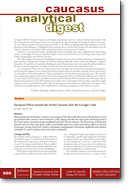Social Exclusion in Georgia

Perceived Poverty, Participation and Psycho-Social Wellbeing
Author(s): Natia Mestvirishvili
Editor(s): Lili Di Puppo, Iris Kempe, Heiko Pleines, Matthias Neumann, Robert Orttung, Jeronim Perovic
Series: Caucasus Analytical Digest (CAD)
Issue: 40
Pages: 2-6
Publisher(s): Center for Security Studies (CSS), ETH Zurich; Research Centre for East European Studies, University of Bremen; Institute for European, Russian and Eurasian Studies, George Washington University
Publication Year: 2012
